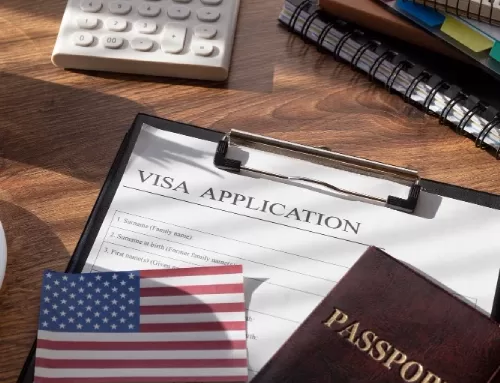Allow us to Guide You
When it comes to immigration, the process can often feel overwhelming, with countless forms, deadlines, and rules to navigate. Whether you’re applying for a green card, citizenship, or a visa, you’re bound to have questions—and you’re not alone. At our office, we hear a wide range of questions every day. Here’s a breakdown of the most common ones and straightforward answers to guide you through the process.
1. How long does the immigration process take?
Questions regarding the time frame of an immigration process are, by far, one of the most frequently asked questions—and understandably so! Immigration timelines vary widely depending on the type of application, the service center processing your case, and your circumstances.
For example:
• Green Card through family: Processing times can range from 10 months to several years, depending on whether you’re applying as an immediate relative or under a preference category.
• Naturalization: This process typically takes 8–12 months, though it can be longer in some areas.
• Work Visas: These are often quicker, with timelines ranging from a few weeks to several months, depending on the type of visa and processing options like premium processing.
Unfortunately, there’s no one-size-fits-all answer, but we always encourage our clients to prepare for a wait. The earlier you start the process, the better.
2. What is Form I-130, and why is it important?
Form I-130 is a Petition for Alien Relatives and it is a foundational part of family-based immigration. It’s the form you file to establish a qualifying relationship between you (the petitioner) and your relative (the beneficiary).
For example, if you’re a U.S. citizen wanting to bring your spouse to the U.S., filing Form I-130 is the first step. While it doesn’t grant immediate benefits, it allows your relative to eventually apply for a green card.
A common misconception is that the process is complete once the I-130 is approved. There are additional steps, like filing Form DS-260 (for those abroad) or adjusting status (for those already in the U.S.).
3. Do I need an attorney to apply for immigration benefits?
Legally, you don’t need an attorney to file an immigration application, but having one can make a huge difference. The U.S. immigration system is complex; even tiny form mistakes can lead to delays or denials.
An immigration attorney can:
• Help you understand what you qualify for.
• Ensure your application is accurate and complete.
• Represent you in case of requests for evidence (RFEs) or legal complications.
Think of it this way: You wouldn’t go to court without a lawyer, and immigration is no different. Having someone experienced can save you time, money, and stress.
4. Can I work while my immigration case is pending?
Work eligibility depends on your immigration status and what you’re applying for. If you’re in the U.S. on a work visa, you can generally continue working as long as your visa remains valid.
Avoid working without proper authorization, as this could jeopardize your immigration case. Always check with an attorney if you’re unsure about your eligibility to work.
5. What’s the difference between a green card and Visa?
A visa is a form of paperwork e.g., document that provides you with the ability to enter the U.S. for a specific purpose, such as tourism, work, or study. Think of it as your ticket to cross the border. Once you’re in the U.S., your visa’s expiration date doesn’t necessarily dictate how long you can stay—your status matters.
Green cards let you to live and work in the U.S. indefinitely, though it must be renewed every 10 years. Unlike a visa, a green card is a pathway to U.S. citizenship if you decide to eventually apply.
6. What happens if my case is denied?
Denial can be heartbreaking, but it’s not always the end of the road. Depending on the reason for the denial, you may have options to appeal, file a motion to reopen or reapply.
For example:
• If missing documents caused your application to be denied, a motion to reopen might be appropriate.
• If there was a legal error in your case, you may consider filing an appeal with the Administrative Appeals Office (AAO).
7. Can I travel while my application is pending?
Travel access depends on the type of application you’ve filed. For instance:
• Adjustment of Status Applicants: If you’ve applied for a green card from within the U.S., you generally need advance parole (travel authorization) to leave the country. Traveling without it could result in your application being considered abandoned.
• Visa Renewals or Extensions: If your visa is expired or close to expiring, traveling outside the U.S. can be risky and may require reapplication.
Always consult your attorney before making travel plans to ensure you don’t accidentally jeopardize your case.
8. What should I do if my visa is going to expire soon?
Options include:
• Extending your visa: You must file an extension with U.S. Citizenship and Immigration Services (USCIS) before your visa expires.
• Changing your status: If you qualify for a different visa category, you may apply to switch statuses without leaving the U.S.
Remaining in the U.S. after your visa expires can have serious consequences, including a ban on reentering the country.
9. How do I prepare for an immigration interview?
The immigration interview is often the final step in your journey, so feeling nervous is natural. Here are some tips to help you prepare:
• Be honest: Answer all questions truthfully.
• Review your application: Know the details of your case inside and out.
• Bring the proper documents: Double-check your interview notice for a list of required documents.
If you’re married and applying for a spousal green card, expect personal questions about your relationship. Practicing with your attorney beforehand can help ease your nerves.
Your Journey, Our Priority
Immigration can be a challenging process, but it’s also a journey toward a brighter future. Remember that you’re not alone, no matter where you’re starting from or what obstacles you face.
If you have more questions or need personalized guidance, please contact our team. Visit our website or contact our offices directly.
Florida: (561) 651-9322
Georgia: (770) 884-8400






